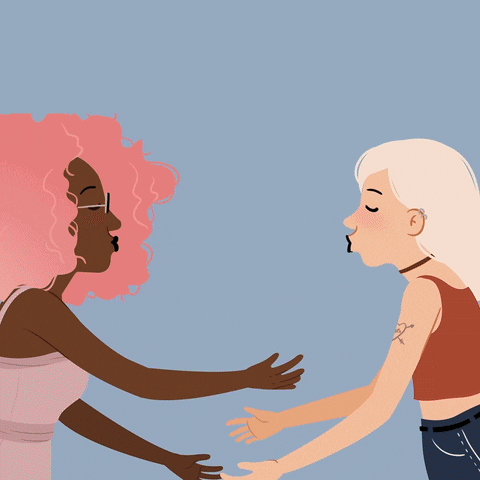
Tik Tok becoming the New HubSpot for Mental Health Diagnoses
And it’s shifting the way we discuss mental health…
With the help of Tik Tok and social media there has been an influx of misused terms to self diagnose. With influencers taking over the public voices, terminology such as manic, autistic, and ADHD circulating as buzzwords.
To BFFR (be fucking for real) – cutting your hair at 3 a.m. cause you can’t sleep and you’re adjusting to the single life is not your intrusive thought’s ‘winning’. Rather, it is an impulsive one. But why is it that society is hyper-fixated on turning detrimental mental health issues into trends?
While the surge of viral videos surrounding mental health help to destigmatize and create inclusivity, it is heavily polluted with misinformation. When you see a video with 150k likes about someone’s POV on mental illness it isn’t uncommon for you to think ‘omg not me showing all these signs‘.
Remember the Tik Tok phenomena where the development of tics in neurotypical teens arose based on the virality of Tourette videos? Showing how easily influenced especially the youth are.
With access to how-to-guides on Eating Disorders (ED) or the glamourization of narcissism coated with your favorite influencers, Tik Tok is reshaping the way we look at mental health.
But the question becomes why shouldn’t victims of ED’s, physical or substance abuse, or having debilitating mood & personality disorders be allowed to share their truths. Cope with it through mindful humor, show their progress and relapses, or share a heartfelt survivor’s story?
My take…it’s not the influencer, or mental health advocates, or Gen-Z, or hardly even cell phones to blame. Although accountability is necessary and doing your part to research terms before carelessly tossing them around is important…It may cut much deeper into the systemic fabric of the Health Care System in America. Since human error is inescapable, the system itself remains the foundation that determines a civilizations quality of life.
How the Health Care System is Letting us Down
Mental health is vital for someone’s overall well-being. Yet the access to health care professionals is not always accessible. Getting access to free or affordable therapy is out of reach for most without health insurance. Even with an insurance provider, typically through your work, it may or may not cover therapy/counseling. And let’s face it if you require in-unit care, a company is likely to ditch you.
But let’s say you have health insurance that covers therapy, you may be denied treatment as most insurers only pay for medically “necessary” services which could require a mental health evaluation with a diagnoses.

Not having a handle on your mental health can not only affect your mind but also the physical state of your body. One of the common mental health crisis is stress. This is widely known as the silent killer. It can creep up on an individual and before they realize it they’re experiencing symptoms such as:
- Difficulty breathing
- High Blood Pressure
- Unexpected weight gain or weight loss
- Loss of interest in sex
- Changes to your menstruation cycle
- Indigestion
- Worsening of already existing chronic health problem
- Hair loss
According to the recent reports from Mental Health in America, 55% of adults with mental health issues are not receiving treatment. That’s over 28 million Americans! How is that we can ask individuals to stop attaching mental health concerns to themselves when the accessibility to receive answers, treatment, or just to have a qualified and unbiased individual to talk to is limited?
The next best option? Heading online to connect with people who have similar symptoms. Allowing them the clues to analyze their own trauma and pain. This creates a safe community that becomes validating while also providing the language to express their emotions.
What Health Care Professionals are Doing to Help
The problems with health care is systemic and doesn’t take away from the Health Care Professionals that help aid individuals or provide access to information through content creation. Yup tik-tok included!
Organizations like Mental Health in America do a great job in providing statistics and providing resources for those who are need or want to better educate themselves on the surrounding topics. The information is out there and knowledge becomes more accessible everyday.
While getting to the systemic root of the cause is the ideal solution it is not immediately tangible. People lose themselves and their lives each day and a big effort in helping is stopping the romanticization of mental illness, stopping the spread of misinformation, and minimize stigma by creating safe spaces for vulnerability even if it’s online.






